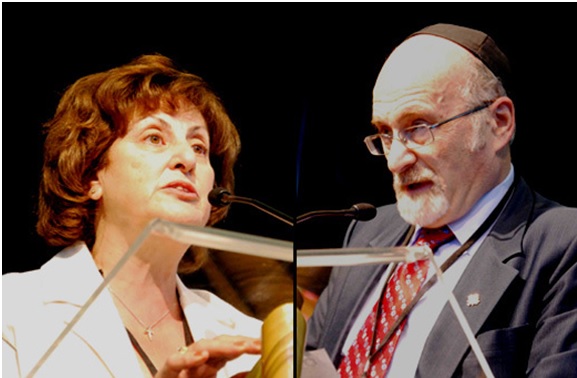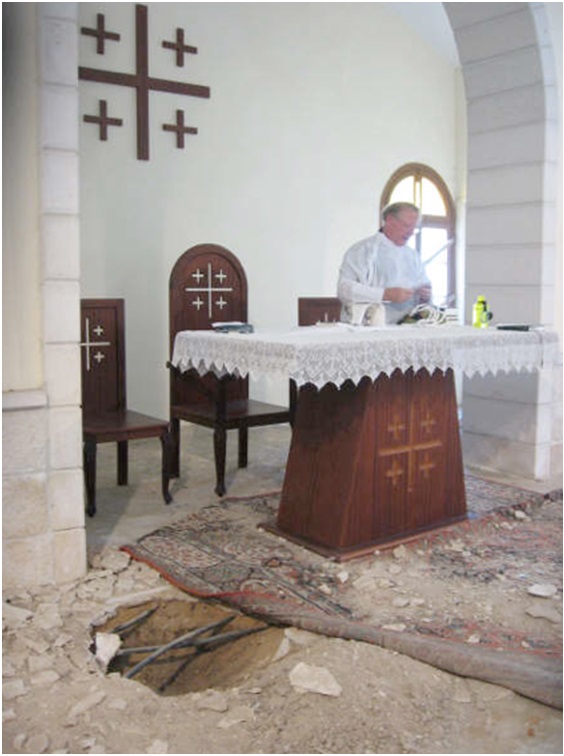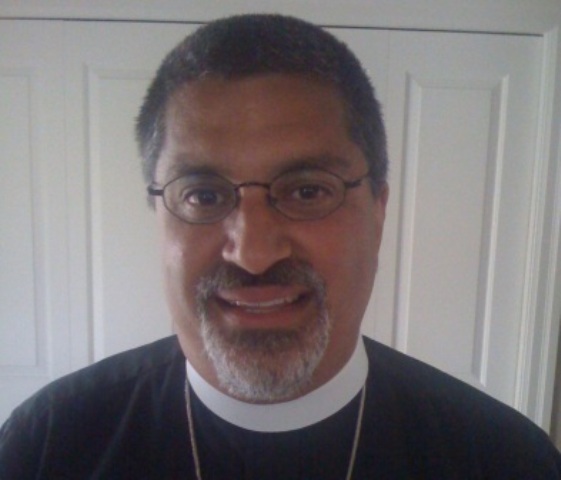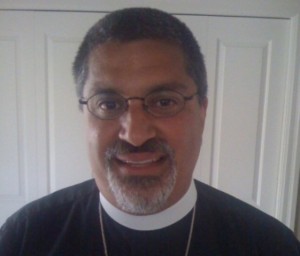LETTER FROM CANADA: “Captivity led captive” — for some – by Robert Assaly
Acutely conscious of Palestinian Christians’ cry to us and to churches around the world for liberation for all Palestinians, Canadian churches engaged the Kairos Palestine (KP) document. However, little did we imagine this would have implications for liberation of the Church at home! And yet in a cruel irony typical of the Palestinian-Israeli conflict, there is still something wrong with this picture when North Americans, not Israelis and Palestinians, are the beneficiaries of this cry for liberation.
This reflection comes as we mark the Ascension, when the Church reads, “He ascended on high and led captivity captive” (Ps. 68.18) – a key liberation text. Palestinian theologian Canon Naim Ateek (of Sabeel, in Jerusalem) has articulated a stunning metaphor for the core problem underpinning the challenge of liberation in that conflict. Israel’s birth in 1948 has as its mirror event the Palestinian Nakba (Catastrophe) – the dispossession of Palestinians to make way for the birth of a Jewish state. He thus named Israel as having been born in original sin. And he theologically explained how reconciliation would be almost inevitable when Israel confronted and overcame the conditions of its birth.
Ateek would know; indeed he remembers. His childhood expulsion from his birthplace, Beisan, with his family in 1948, was vividly recollected, along with the only return visit with his father when they were first permitted to travel a full decade later. They were denied entry to their house by the Jewish family that had claimed it, the Arabic village name had been changed, the churches transformed to various uses to suit the new Jewish residents. Their history and narrative – the foundational instrument of Palestinian liberation — had been denied and even erased.
In his landmark book, Justice and Only Justice: A Palestinian Theology of Liberation (1989), Ateek names the implications of silencing a narrative. He describes how the refugees tried to “tell their story” but often it fell on deaf ears in the west, thereby giving rise to violence as an alternative recourse (p.14). If there is any redemption for Israel’s birth in ethnically cleansing the Palestinians, and any reconciliation, it will begin by taking captive that very silencing; liberating the truth.
Of this, Canadians have little doubt. A federally appointed Truth and Reconciliation Commission, encouraged by the Church, continues working prominently across the country to confront our own history with the aboriginals of this land. Most notably, the Commission’s work has been to allow victims of Residential School abuse to tell their stories toward gathering the narrative, marking the beginnings of that healing process.
Yet in terms of making space for the Palestinian Christian narrative, the Canadian churches frequently acceded to being held captive, and by rather negative forces. I do not think it is hyperbole to observe that the Kairos Palestine document will be remembered as a turning point in this regard – indeed a Kairos moment for the life of the Canadian Church – liberating us from the easy path of acquiescing to being silenced. Because of the uniquely powerful groups arrayed against justice and peace in Palestine as confirmed by Archbishop Tutu, and the consequences for breaking the silence, I have considered truth-telling on Palestine to be a litmus test for courage, even integrity.
Specifically, what we ourselves were liberated from is named by a keen observer of the churches’ relationship to Judaism as “The Ecumenical Deal.” Dr. Marc Ellis, who 25 years ago, in tandem with Ateek’s work, launched Toward a Jewish Theology of Liberation, has not explicitly called “The Deal” Faustian. Nonetheless, it is the tacit arrangement whereby the church allows legitimate criticism of the state of Israel to be labeled anti-Semitic, such “that to support Jews they have to be silent about what is happening to Palestinians.” Yes, silent.
I would argue that the KP document constitutes, at a minimum, the straw that broke the back of The Ecumenical Deal in Canada.
The prize for buying into the Deal is maintaining relations with its peddlers — establishment Jewish organizations which are nothing less than that Israel Lobby, ranked in the top handful of the Fortune 500 “Power 25” rankings. Their primary vehicles of influence in the Church are often national Christian-Jewish Dialogues.
First then, let us disclaim the Lobby’s disclaimers, as the blunt end of the Ecumenical Deal relies on the veil maintained by these denials. Beyond the disingenuous retort that there is no Israel Lobby, for decades the official interlocutor in the Dialogue, the Canadian Jewish Congress (CJC), was stealthily integral to it. I was invited to be the ecumenical keynote speaker at the national Presbyterian General Assembly in 2010, to address the KP Document. The requisite CJC opposition “partner” was there too, shamelessly introduced as their chief lobbyist in Ottawa. The CJC’s attack on the KP document cobbled together for the occasion exposed the shallowness of their claims as it was accompanied by a CRO (church-related organization) document supporting KP in a mailing to all presbyteries across the country.
The other essential disclaimer is that the interfaith Dialogue claims to be theological, suggesting the exclusion of a foreign policy agenda. My experience has been otherwise. In any event, the veil was dropped recently; internecine struggles among the establishment Jewish organizations resulted in the bitter “smothering” of the CJC, replaced by The Centre for Jewish and Israel Affairs at the Dialogue table. Its very name belies any pretense of disinterest in a solidly Israel-first agenda, while leaving many wondering how the Dialogue might even broach theology.
The preferred enforcement method for the Deal had been clandestine tactics directed at heads of Churches. In 2000, the Canadian Council of Churches sent me along with a colleague on a fact-finding visit to Palestine and Israel, accompanied by a statement of solidarity signed by Canadian church leaders to their Jerusalem counterparts. We were greeted upon arrival with a fax indicating most signatories had recanted. Disappointed Jerusalem Church leaders were mystified at how they could be abandoned by their brothers and sisters in Christ. Upon our return, we traced the reversal to the Christian overseer of the Dialogue having quietly red-flagged the letter to the CJC, which in turn directly pressured each Church leader with the instrument of the Deal. The subsequent outrage of the Arab-Canadian community toward the churches was reported in the secular press.
This followed upon the establishment of “the two-track” process, which was supposed to allow the partnership side of the Church to freely engage the Middle Eastern churches without Dialogue interference. This came about after bringing to light the self-censoring (read: silencing) of these partnership relations under Dialogue surveillance.
The blowback from clandestine operations pushed the Lobby into tactics of open confrontations. When the Bishop of Ottawa earned the front-page headline in the Ottawa newspaper following his Christmas sermon at the Cathedral describing Israel’s treatment of Palestinians, the Israeli Ambassador attempted to embarrass him. This tactic backfired. The Bishop was applauded for standing on principle and, further, for hosting a North American conference on Jerusalem co-sponsored by Friends of Sabeel – North America (FOSNA). The conference was brought to a pregnant hush after the same above-mentioned lobbyist representing the CJC invoked the Holocaust and insinuations of anti-Semitism. Dr. Ellis, on a panel, jumped to his feet, grinned, and claimed, “You’re trying to silence us. We won’t be silent.”
The Ecumenical Deal incidents aiming to silence the Canadian churches, often successfully, could fill volumes. Then came the KP document.
Speaking with one voice for Palestinian Christians, and with a rare endorsement by all the Jerusalem Heads of Churches, the KP “Word of faith, hope and love from the heart of the Palestinian suffering” could not be ignored. KP included theological reflection, articulation of why the occupation of Gaza, the West Bank and East Jerusalem is an “evil,” the elaboration of the place of faith toward ending that suffering and effecting reconciliation, and the requirement of action in the form of non-violent economic measures including Boycott, Divestment, Sanctions (BDS).
Our immediate response was to convene Church Middle East staffers for the first time jointly with CROs, and focused on KP, however in a new broader and unshackled configuration dubbed The Forum. Thus the long harassed 25 year-old Middle East Working Group of only some church staff yielded to a space where partnership issues could be freely discussed and engaged without an institutional conduit to the Dialogue. Thus I believe KP will be remembered here as a turning-point, giving voice to the Palestinian narrative unchallenged by “balance” with the voices of oppression. KP has liberated us from the captivity to the Ecumenical Deal, allowing honest and critical partnership with Palestinian Christians, without looking over our shoulder. And the fruits are already proving rich, promising, and faithful.
A notable achievement is the success of a return visit to Canada of KP staffer Nora Carmi, also the West Banker chosen on behalf of Palestinian Christians to address Pope Benedict personally during his visit to Bethlehem. Despite later being an overseas guest speaker at the United Church of Canada’s General Assembly in 2009, she was mostly sidelined by the presence of an inter-faith partner, a prominent rabbi and former CJC president. The three resolutions on BDS went down to defeat.
Last year on her Forum-initiated post-KP return, with no pro forma Lobby counter-narrative, Nora Carmi eloquently voiced the call to BDS to church leaders, the general public and, in a speech in the Parliament Building, to Senators, Members, Foreign Affairs staff and diplomats.
Only a few weeks later, the United Church of Canada’s boycott resolution passed at General Assembly with overwhelming support. This came on the heels of Lobby success in the USA with the Presbyterian and United Methodist national conventions, where divestment failed by a razor-thin margin, and despite tens of thousands of Lobby dollars invested trying to defeat the Canadian resolution. Along with Lobby enlisting of the national media and even a coalition of Senators, a former CJC representative’s brandishing the Ecumenical Deal at the Assembly was apparently no match for the liberated narrative of Palestinians.
As a direct result of the debate around that boycott resolution, for the first time, a coalition of national Arab-Canadian organizations met with the Forum, and then with Heads of Churches or their appointees. This may itself coalesce into a table with the churches where these groups can have their voices heard, deepening church relations with the region. Moreover, the churches can for the first time hear Canadian voices on all sides – progressive Jewish voices, Dialogue interlocutors, and Arab- and Muslim-Canadians – without allowing suppression of narratives.
Liberated from our own captivity to the Ecumenical Deal and its accompanying fears of being tarred with an anti-Semitism libel, the KP call to us has in significant measure moved the Canadian churches further to giving unfettered voice to the Palestinian narrative, free of an artificial balance with an offsetting voice of oppression. Perhaps it is a sign of authentic partnership that underscored our own deficiencies, however ironic, when in fact we are the beneficiaries of Palestinian Christians’ cry for liberation.
In the 1990s, the Rev. Robert Assaly was Director of the Middle East Council of Churches office in Jerusalem and the Episcopal Vicar of Gaza. He was for a decade the Canadian Council of Churches representative to the UN coordinating committee of North American NGOs on the Question of Palestine in New York. Later he was rector of a rural parish priest in the Diocese of Ottawa where he was born, and is now pursuing a Ph.D. at McGill University. He continues as Chair of the Canadian Friends of Sabeel.




